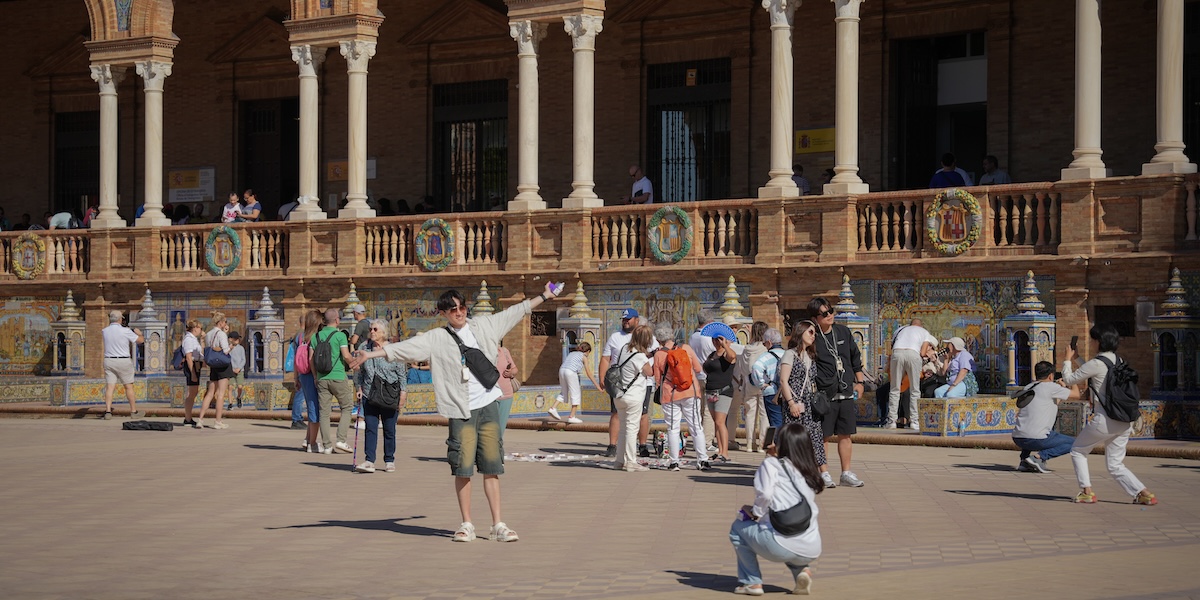The city of Seville, Spain, is planning to cut off the running water supply to around 5,000 apartments in the city, which, according to the city’s estimates, are being illegally rented out for short periods as tourist accommodation. Seville is the capital of Andalusia, the southernmost region of Spain, and is one of the cities with the most tourist attractions in the country. For some time, as in many other places in Spain and beyond, residents have been complaining about various problems linked to the excessive influx of visitors, such as the lack of long-term rental housing for residents and the overcrowding of central neighborhoods. This year, politics has begun to address it.
According to anonymous sources within the Seville municipality with The paysThe 5,000 irregular tourist accommodations are divided between those that are properly registered as such with the municipality, but violate the rule according to which apartments for short-term rental can only be on the ground or first floor, and others that do so instead and are not even registered. The municipality has verified that they are used as tourist accommodation by referring the data at its disposal to those of the online platforms that allow you to rent holiday homes.
But the opposition to the municipal council believes that the measures being discussed will be difficult to implement and will not have tangible results: the municipality's plan calls for only 10 inspections per week in designated accommodation sites, so the implementation times will be very long, unless the number of inspectors is increased. The opposition also criticized the municipal council for rejecting its proposal two months ago to stop granting new licenses for tourist accommodation.
Indeed, even the city’s mayor, José Luis Sanz, of the Popular Party, Spain’s main centre-right party, has put forward a proposal to limit the number of homes rented to tourists, which would however set a much higher percentage of rentable homes than previously. The opposition wanted this. The mayor’s proposal would essentially limit short-term rentals to the city centre and the Triana neighbourhood, the two areas most frequented by tourists, but not to the rest of Seville.
– Read also: Can we be responsible tourists?
According to the opposition Socialist Party, the municipality's plan to cut off running water may not be legal for apartments whose supply is regularly paid for. The municipality denies this, citing the opinion of its legal advisors. It also claims that once the water cuts start, the number of accommodations rented irregularly to tourists will drop dramatically to avoid the consequences of repression: the plan will essentially have a deterrent purpose.
Even according to Iniciativa Ciudadana Sevilla, a residents' association that opposes mass tourism in the center of Seville, the initiatives proposed by the municipality will be of limited effectiveness, also because they do not concern many accommodations that are rented on a regular basis. Instead, the association has asked for the suspension of the granting of new licenses. However, Iniciativa Ciudadana Sevilla is also critical of the Socialist Party, accusing it of favoring the development of mass tourism during its previous mandates.
The municipal plan should first concern the 715 apartments that are rented for short periods even though they are located on floors higher than the first, starting with those in the centre and in the Triana area.
– Listen also: Tourism has changed cities, Globo episode with Filippo Celata

“Reader. Travel maven. Student. Passionate tv junkie. Internet ninja. Twitter advocate. Web nerd. Bacon buff.”




